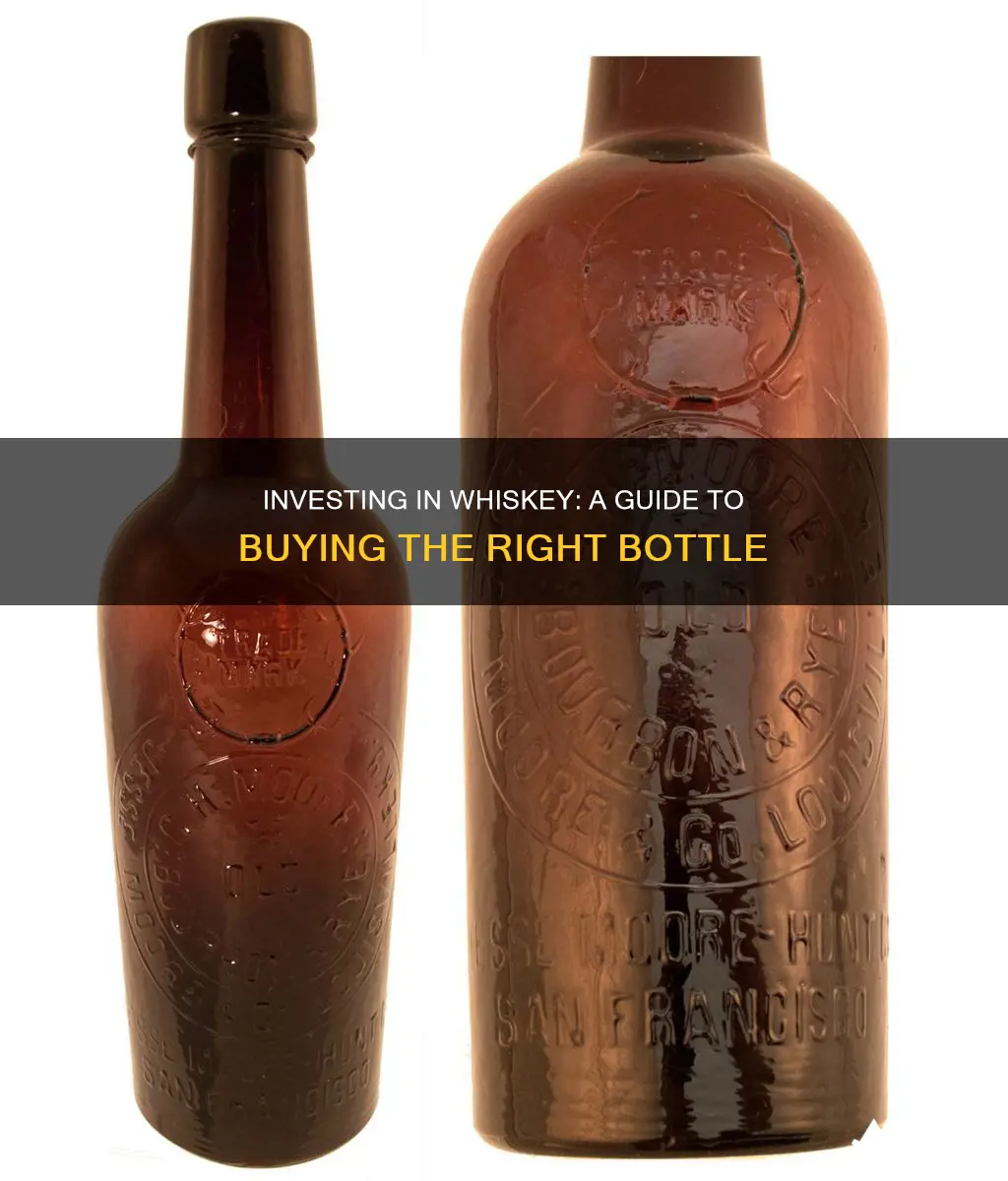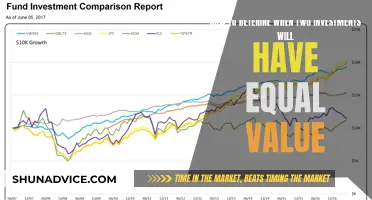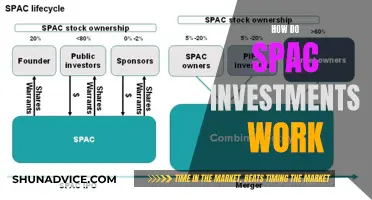
Whisky can be an attractive alternative investment asset, similar to gold, wine, and real estate. The demand and prices of whisky have grown steadily even during the pandemic, with the market exceeding $60 billion in 2020 and projected to grow at a 5.9% annual rate between 2021 and 2027. Rare whisky bottles often sell for hundreds of thousands of dollars, and the average annual return on whisky is about 10% for private investors. However, investing in whisky is a long-term endeavour and it can be tricky to navigate the many options available.
| Characteristics | Values |
|---|---|
| Type of Investment | Bottles, Barrels, Stocks & Funds |
| Budget | A few hundred dollars for bottles, $20,000 for casks |
| Timeframe | Long-term investment |
| Brand Names | Macallan, Yamazaki, Karuizawa, Hibiki, Buffalo Trace, Pappy Van Winkle, Suntory, Michter's, George T. Stagg, Blanton's, Laphroaig, Springbank, Glenfarclas, Redbreast, Teeling, Midleton, Bushmills, Jameson |
| Age | Older whiskies tend to be more valuable |
| Distillery | Look for up-and-coming new distilleries or whiskies from closed distilleries |
| Limited Editions | Limited editions from new, popular distilleries are a good choice |
| Single Casks | Single casks from distilleries with new ownership |
| First Bottling | Research when a new distillery might release its first bottling |
| Ballot Systems | Enter ballots for limited releases |
| Auctions | Keep an eye on auction prices |
| Online Platforms | Use intelligent online investing platforms like Vinovest |
| Storage | Secure optimal storage conditions for bottles |
| Returns | Average annual return on whiskey is about 10% for private investors |
What You'll Learn

Rare and annual bottlings from premium brands
When it comes to investing in whiskey, rare and annual bottlings from premium brands can be a good option, often outperforming the S&P with less volatility. Here are some options to consider:
The Macallan 18 Year Old Sherry Oak
The Macallan is a well-known Scotch distillery that releases several limited editions per year. Their annual release of The Macallan 18 Year Old Sherry Oak is a safe investment option. These bottles tend to increase in value soon after release and continue to provide healthy annual returns. It's a less risky choice with steady rewards.
Pappy Van Winkle’s 23 Year Old
Pappy Van Winkle's 23 Year Old Family Reserve Bourbon is another sought-after option. Released by Buffalo Trace every fall, acquiring any bottle from their range is a challenge. This particular expression can set you back $300-400 if purchased through a lottery or raffle. However, its value increases significantly over time, with bottles often reselling for 10 times their original price.
Yamazaki 18 Year Old
If you're looking for geographic diversity in your whiskey portfolio, consider Suntory's Yamazaki 18 Year Old. This whiskey, inspired by the sweet honey, vanilla, and floral notes of Speyside and Lowland Scotch whiskies, is in perpetual demand from enthusiasts and investors alike. It offers an average annualised return of 16.89%, placing it among the top medium-long-return investments in the whiskey category.
Michter’s Celebration Sour Mash 2022
Michter's, a distillery with roots tracing back to 1753, released the Michter’s Celebration Sour Mash Whiskey in 2022. With only 328 bottles released, this limited edition expression offers a unique opportunity for investors.
George T. Stagg Kentucky Straight Bourbon
Part of the Buffalo Trace Antique Collection, George T. Stagg Kentucky Straight Bourbon is an annual release known for its rich colour and flavour. With a high proof, this whiskey is a popular choice for investors, often reselling for 5-10 times the MSRP. It's a good option for medium to long-term investment if you can resist the temptation to open the bottle!
Remember, investing in whiskey comes with risks and potential rewards. Always do your research and only invest what you can afford to lose (or drink)!
Hotel Investment: Now or Never?
You may want to see also

Limited editions from new distilleries
When it comes to investing in whiskey, limited editions from new distilleries can offer unique and exciting opportunities. While established distilleries with long histories and proven track records are always a safe bet, the limited editions from up-and-coming distillers can provide a chance to get in on the ground floor of something special. The key is to identify those with potential, those that could become the next big name in whiskey, and here's why:
New distilleries often bring innovation and a modern approach to whiskey-making. They experiment with different techniques, casks, and finishes, creating unique expressions that stand out in the market. These limited editions are often produced in small batches, with each release offering something distinct, making them highly collectible. For example, the Texas-based Balcones Distilling, founded in 2008, quickly gained recognition for its innovative use of blue corn in whiskey production, creating a range of award-winning, limited-edition expressions that have become sought-after by collectors.
When considering which new distillery to invest in, look for those with a strong vision and a passionate team. A unique story, a commitment to quality, and an understanding of the market are also good signs. Many new distilleries are founded by experienced master distillers or industry experts, so keep an eye out for familiar names. For instance, the Durham Distillery in the UK, founded by master distiller Jess Tomlinson, has gained acclaim for its small-batch, experimental whiskeys, with limited editions selling out quickly.
Additionally, investing in these limited editions allows you to support the craft whiskey movement and discover new and exciting palates. These small-batch whiskeys often showcase unique flavor profiles and experimental techniques, providing a diverse drinking experience. It's a chance to be part of a distillery's journey from the very beginning, and as their whiskeys mature and develop, so too does your investment. So, keep an eye on new distillery releases, do your research, and consider investing in their limited editions – it could be a very rewarding venture.
Who Pays for Investment Advice?
You may want to see also

Single casks from distilleries with new ownership
Research is Key:
Keep an eye out for new distilleries releasing their first bottlings, enter ballots for limited editions, and look for single casks from distilleries under new ownership. For example, the distillery special from Raasay or single casks from GlenAllachie, which recently changed ownership, are great choices. These bottles are typically affordable, costing around £100 or less, depending on the age statement.
Limited Editions:
Limited editions are often released in small quantities, making them highly collectible and valuable due to their rarity and unique flavours. Keep an eye out for limited editions from prestigious distilleries, which may be discontinued or changed, or up-and-coming newer distilleries.
Age and Rarity:
Generally, older whiskies are more valuable, as they've had more time to mature and develop complex flavours. Rarity also adds to a whisky's value. Limited-quantity releases, such as the Teeling Vintage Reserve 24-Year-Old or the Bushmills 21-Year-Old Single Malt, are likely to continue increasing in value.
Distillery Reputation:
Reputable distilleries with a long history of producing high-quality whisky are a safer bet. They have a reputation to uphold and are likely to use high-quality ingredients and master distillers or blenders to ensure the whisky's quality.
Market Demand:
Consider the current market demand for a particular whisky. If it's in high demand, it may be due to positive reviews and a strong reputation among enthusiasts. This demand can also indicate the whisky's potential future value, as limited supply and high demand can drive up prices.
Work with Experts:
Investing in whisky, especially casks, can be complex. Consider working with a reputable whisky investment company, such as the Whiskey & Wealth Club, to gain valuable insights and navigate the industry. They can guide you towards promising investment opportunities and help maximise your chances of success.
Paying CKS Prime Investments: A Step-by-Step Guide
You may want to see also

Older whiskies
When investing in older whiskies, it is important to keep in mind that the most historic and respected distilleries are usually responsible for the most expensive whiskies. For example, the Macallan distillery in the Speyside region set a record when a bottle of its 1926 single malt sold for $2.7 million at an auction in 2023. Similarly, a bottle of The Macallan 18-Year-Old Single Malt Scotch Whisky increased from $874 in December 2021 to $1,339 in December 2022, a jump of 53%. The Macallan is one of the most storied Scotch distilleries and producers of top-shelf whisky, and its older vintages (18 years or older) usually give beyond satisfactory results at auction events.
Another sought-after whisky is the Yamazaki Single Malt, considered the father of Japanese single malt. A bottle of the Yamazaki 18-Year-Old Single Malt Whisky is priced at $209. According to recent data, investors can expect an average annualised return of 16.89% from a bottle of Yamazaki 18 Years Old, placing it near the top of medium-long returns when it comes to whisky investing.
The Bowmore 50 Year Old Single Malt Scotch Whisky is another excellent example of a valuable older whisky. The price of this whisky rose from $24,869 in November 2021 to $49,760 in July 2023, an increase of 100.1%.
When investing in older whiskies, it is important to do thorough research and be aware of fluctuations in the whisky market. It is also crucial to check the credentials and history of any firm or individual you do business with, as there is always the risk of being defrauded when making an investment.
Will Brooks Investments: Navigating the Financial Landscape
You may want to see also

Whiskies from closed distilleries
Whisky from closed distilleries is a good investment option because of its rarity and the unique chance to taste a part of whisky history. These whiskies are produced by distilleries that are no longer operational, often due to financial struggles, changes in ownership, or natural disasters. As a result, their whisky is no longer available, making it highly sought-after by collectors and enthusiasts.
When investing in whiskies from closed distilleries, it is essential to consider the distillery's history and the characteristics of the whisky itself. The rarity, age, vintage, distillery, brand, cask type, and warehouse and whisky-making process can all impact the whisky's value and potential for appreciation.
- Port Ellen and Brora in Scotland are two well-known closed distilleries. Their whiskies have become valuable due to their rarity.
- Littlemill 1992 Vintage Traveller Exclusive with Miniature 45.3% is a rare whisky from the closed Littlemill distillery.
- Port Dundas 17 Year Old Whisky Cask #73895 Lady Of The Glen 58.1% is another option from a closed distillery.
- Caperdonich 1997 Cask 19130 Lady Of The Glen 60.5% is a whisky from the Caperdonich distillery, which is no longer in operation.
- Littlemill 1988 30 Year Old Whisky Legends Collection 51.5% is a 30-year-old whisky from the closed Littlemill distillery, offering a unique taste of history.
Remember that investing in whisky carries certain risks, including the delicate nature of the bottles and the potential for loss or damage. It is also a long-term investment, and market conditions can impact the value of your investment. Conduct thorough research and consult experts before making any investment decisions.
Market Signals: Unlocking the Secrets of Investment Institutions' Strategies
You may want to see also
Frequently asked questions
There are several factors to consider when investing in whiskey, including:
- Limited editions and rare casks: Limited edition whiskeys are released in small quantities, making them highly collectible and valuable.
- Age of the whiskey: Older whiskeys are generally more valuable due to their complex and unique flavour profiles.
- Reputable distilleries: Reputable distilleries have a long history of producing high-quality whiskey and are more likely to use high-quality ingredients.
- Current market demand: A whiskey that is in high demand may indicate that it is highly regarded by enthusiasts and collectors.
- Work with a reputable whiskey investment company: Expert guidance is crucial when investing in whiskey, especially when navigating the complex world of whiskey assets.
Here are some popular whiskey options for investment:
- The Macallan 18 Year Old Sherry Oak: A well-known Scotch distillery that releases several limited editions per year. Bottles tend to increase in value soon after release.
- Pappy Van Winkle’s 23 Year Old: Released by Buffalo Trace, this whiskey is highly sought-after and can provide significant financial gains.
- Yamazaki 18 Year Old: A legendary whiskey from Suntory, known for its sweet honey, vanilla, and floral notes. It has an average annualised return of 16.89%.
- Redbreast 21-Year-Old: A highly sought-after, single pot Irish whiskey with a rich, complex flavour profile. Its limited availability makes it a promising investment.
- Midleton Very Rare: A premium blended Irish whiskey with a complex flavour profile. Its annual release is highly anticipated by enthusiasts and collectors worldwide.
Here are some tips to consider:
- Determine your budget: Investing in whiskey can vary from a few hundred dollars to tens of thousands, depending on your budget.
- Understand it's a long-term investment: Whiskey investment typically requires patience as it may take years to see significant returns.
- Be aware of major brand names: Look for well-known distilleries with a strong track record of producing high-quality whiskeys.
- Find a trustworthy seller: Established sellers guarantee authenticity and can provide valuable advice for investors.
Whiskey investing offers several benefits:
- Stable growth: Historical data shows that the whiskey industry has experienced steady growth over the past decade, indicating promising profits for investors.
- Alternative investment: Whiskey is an attractive alternative investment asset, similar to gold, wine, and real estate. It can preserve and increase in value during economic downturns and inflationary periods.
- Accessibility: Whiskey investment is accessible to both avid collectors and average retail investors, with options to invest in bottles, casks, or stocks.







